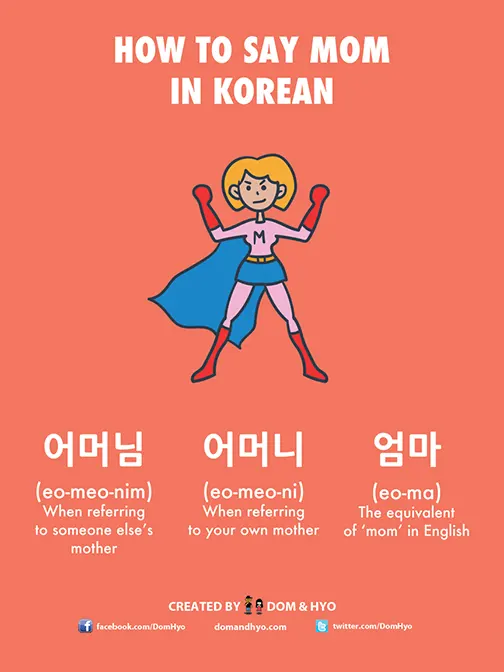
Welcome back for another post on family vocabulary. If you haven’t checked out the other family vocab posts we’ve done, here they are:
Today, we’re talking about a commonly used word, mother. Like other words for family members, I find this one to be easy as well since the casual form sounds a bit like ‘Mama’ in English.
Let’s start with the first form:
어머님 (eo-meo-nim) = This is the formal form of the word mother, and should only be used when you’re addressing someone else’s mother. You would never use this to address your own mother.
This is also used to address your mother in law as well. I always use this to address Hyo’s mom and it is similar to the formal form of father, 아버님. Adding ‘님’ to a title for a person makes it formal. You may also hear this a lot in dramas (especially ones dealing with and focusing on family issues).
어머니 (eo-meo-ni) = This is more casual than the first one and would be used to address your own mother. Most people will use this to address their own mother.
엄마 (eom-ma) = This is the most casual way to say mother in Korean. This should also only be used to address your own mother. Kids especially like to use this one.
If you want to say ‘My mother’ in Korean, you wouldn’t use the commonly used ‘내’ for my, but ‘우리’. For example:
우리 엄마 (u-ri eom-ma)
우리 어머니 (u-ri eo-meo-ni)
You may think that 우리 is only used for ‘we’, but it can mean ‘my’ in many cases.
Now you may ask, is there a mother’s day or father’s day in Korea. The answer is yes and no. Both mothers and fathers share a special holiday called Parent’s Day (어버의날) in May. It’s a pretty big day for parents, and they are usually given flowers, taken out to dinner, and given money.
